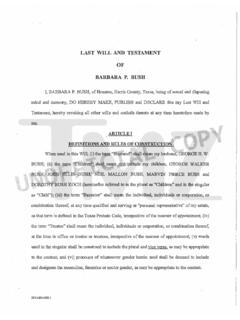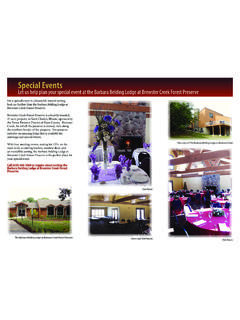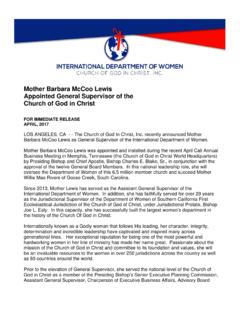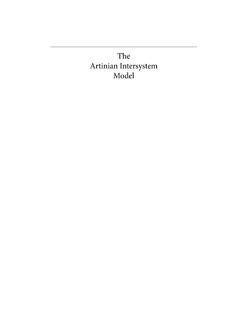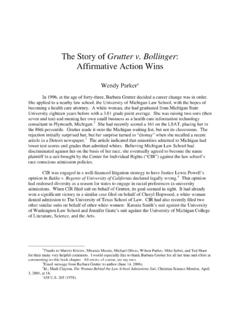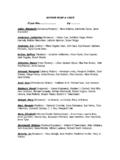Transcription of BARBARA LAZEAR ASCHER On Compassion
1 , BARBARA LAZEAR ASCHER . On Compassion BARBARA LAZEAR ASCHER , born in 1946, worked as a lawyer for two years before she became a full-time writer. Her essays, which have appeared i n newspapers and magazines, have been collected i n Playing after Dark (1986) and The Habit of Loving (1989). She has also written books about her brother's death fi-om AIDS (Landscapewithout Grav- ity: A Memoir of Grief, 1993) and romance (Dancing in the Dark: Romance, Yearning, and the search for the Sublime, 1999). A New Yorkev, ASCHER draws her examples for "On Compassion ". Ffom life in that city. The briefscenes she describes- the encounter on the street corner, the moment in the cafd-allow the reader to imagine the thoughts and feelings of the participants. As you read, take note o f how the specific details of the city enliven her examples and the way that specificity helps the examples to illustrate her argument. The man's grin is less the result of circumstance than dreams or madness. 'His buttonless shirt, with one sleeve missing, hangs outside the waist of his baggy trousers.
2 Carefully plaited dread- locks bespeak a better time, long ago. As he crosses Manhattan's Seventy-ninth Street, his gait is the shuffle of the forgotten ones held in place by gravity rather than plans. On the corner of Madison Avenue, he stops before a blond baby in an Aprica stroller. The baby's mother waits for the light to change and her hands close tighter on the stroller's handle as she sees the man approach. The others on the corner, five men and women waiting for the crosstown bus, look away. They daydream a bit and gaze into the weak rays of November light. A man with a briefcase lifts and lowers the shiny toe of his right shoe, watching the light reflect, trying to catch and balance it, as if he could hold and make it his, to ease the heavy gray of coming January, February, and March. The winter months that will send snow around the feet, calves, ON Compassion - 37. and knees of the grinning man as he heads for the shelter of rights of these people who live in our parks and doorways are Grand Central or Pennsylvania Station.
3 Being violated by involuntary hospitalization. But for now, in this last gasp of autumn warmth, he is still. His I think the mayor's notion is humane, but I fear it is something eyes fix on the baby. The mother removes her purse from her else as well. Raw humanity offends our sensibilities. We want to shoulder and rummages through its contents: lipstick, a lace protect ourselves from an awareness of rags with voices that handkerchief, an address book. She finds what she's looking for make no sense and scream forth in inarticulate rage. We do not and passes a folded dollar over her child's head to the man who wish to be reminded of the tentative state of our own well-being stands and stares even though the light has changed and traffic and sanity. And so, the troublesome presence is removed from the navigates about his hips. awareness of the electorate. His hands continue to dangle at his sides. He does not know Like other cities, there is much about Manhattan now that his part.
4 He does not know that acceptance of the gift and grati- resembles Dickensian London. Ladies in high-heeled shoes pick tude are what make this transaction complete. The baby, weary of their way through poverty and madness. You hear more cocktail the unwavering stare, pulls its blanket over its head. The man party complaints than usual, "I just can't take New York any- does not look away. Like a bridegroom waiting at the altar, his more." Our citizens dream of the open spaces of Wyoming, the eyes pierce the white veil. manicured exclusivity of Hobe Sound. The mother grows impatient and pushes the stroller before her, 5 And yet, it may be that these are the conditions that finally give bearing the dollar like a cross. Finally, a black hand rises and birth to empathy, the mother of Compassion . We cannot deny the closes around green. existence of the helpless as their presence grows. It is impossible Was it fear or Compassion that motivated the gift? to insulate ourselves against what is at our very doorstep.
5 I don't Up the avenue, at Ninety-first Street, there is a small French believe that one is born compassionate. Compassion is not a bread shop where you can sit and eat a buttery, overpriced crois- character trait like a sunny disposition. It must be learned, and it sant and wash it down with rich cappuccino. N c e when I have is learned by having adversity at our windows, coming through stopped here to stave hunger or stay the cold, twice as I have sat the gates of our yards, the walls of our towns, adversity that and read and felt the warm rush of hot coffee and milk, an old becomes so familiar that we begin to identify and empathize man has wandered in and stood inside the entrance. Hc-wears a with it. stained blanket pulled up to his-chin, and a woolen hood pulled For the ancient Greeks, drama taught and reinforced compas- down to his gray, bushy eyebrows. As he stands, the scent of stale sion within a society, The object of Greek tragedy was to inspire cigarettes and urine a s the small, overheated room.
6 Empathy in the audience so that the common response to the The owner of the shop, a moody French woman, emerges from hero's fall was: "There, but for the grace of God, go I." Could it be the kitchen with steaming coffee in a Styrofoam cup, and a small that this was the response of the mother who offered the dollar, paper bag of.. of what? Yesterday's bread? Today's croissant? the French woman who gave the food? Could it be that the home- He accepts the offering as silently as he came, and isgone. less, like those ancients, are reminding us of our common hu- W c e I have witnessed this, and twice I have wondered, what manity? Of course, there is a difference. This play doesn't end- compels this woman to feed this man? Pity? Care? Compassion ? and the players can't go home. Or does she simply want to rid her shop of his troublesome pres- ence? If expulsion were her motivation she would not reward his For Discussion and Writing arrival with gifts of food. Most proprietors do not. They chase the homeless from their midst with expletives and threats.
7 1. What examples of encounters with the homeless does ASCHER offer? As winter approaches, the mayor of New York City is moving lo 2. Imagine and list alternative examples of encounters with the home- , the homeless off the streets' and into Bellevue Hospital. The New less that ASCHER might have used. How might they have changed her York Civil Liberties Union is watchful. They question whether the I essay?

